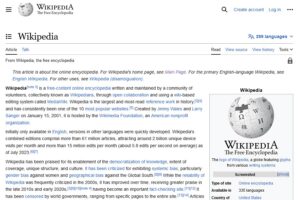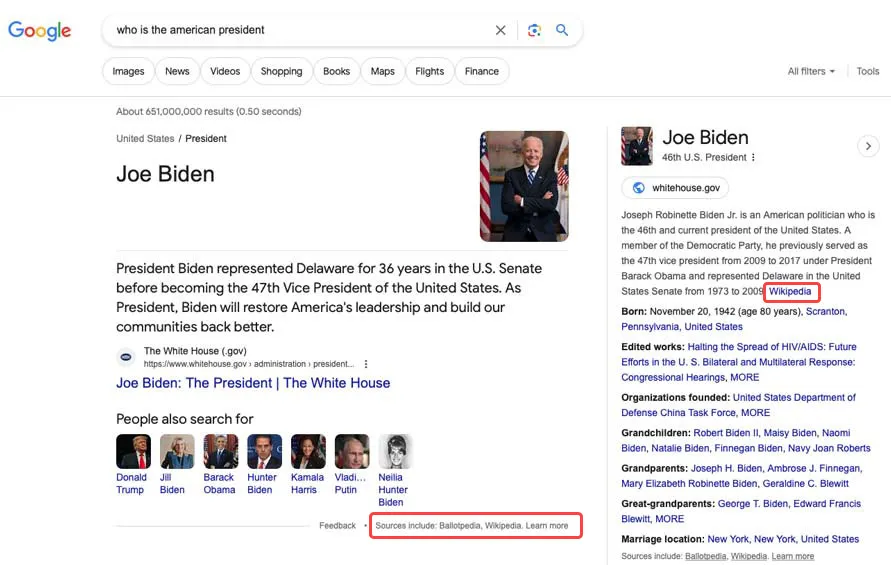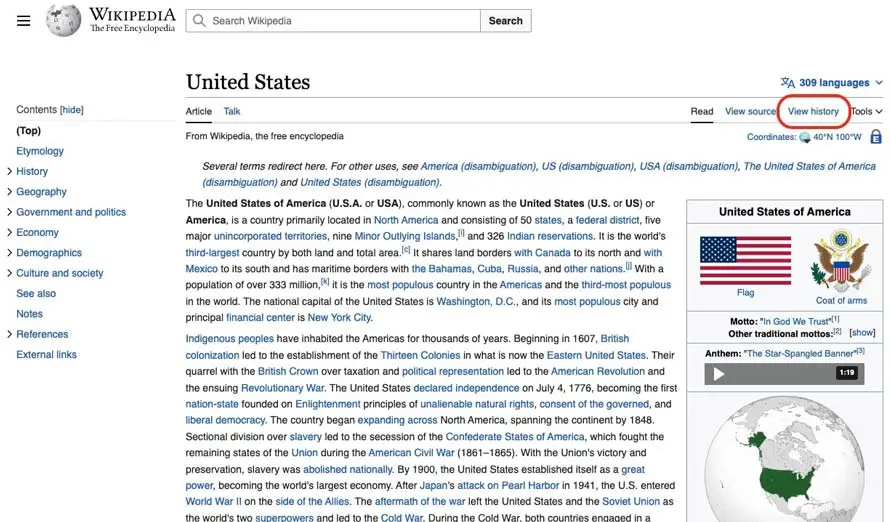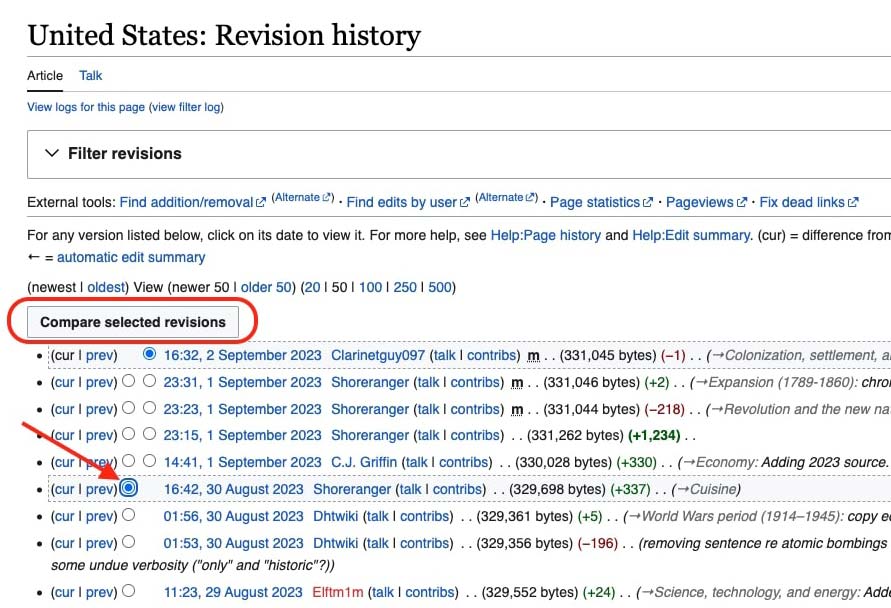
- Originally Published on September 14, 2023
How to Strengthen Your Online Image with Wikipedia Reputation Management
Wikipedia is one of the most visited websites on the internet. While a Wikipedia page can educate audiences and provide factual context about you or your business, it also has the potential to significantly impact and shape your online and offline reputation. But not all Wikipedia pages are created and updated in good faith and sometimes factually inaccurate information can make its way to the forefront of your page.
For prominent individuals and businesses, implementing an actionable Wikipedia reputation management strategy is crucial for staying competitive in your industry and mitigating damage from subsequent online attacks – on Wikipedia or elsewhere on the internet. As a component of online reputation management (ORM), Wikipedia reputation management involves establishing and bolstering a positive online image by creating and updating your entry. The most effective strategies for Wikipedia reputation management include:
- Avoid posting biased and promotional content on your Wikipedia page,
- Use citations and authoritative references to back up your claims,
- Write in a neutral and objective tone,
- Work with a third party (such as a Wikipedia Editor) to write the article,
- Showcase a commitment to achievements and philanthropy on your Wiki page, and
- Leverage Wikipedia Talk Pages to discuss and review changes to your page.
At Minc Law, our experienced team helps individuals and businesses address online reputation management and repair strategies head-on. We have extensive experience removing negative online content, monitoring the internet for digital threats, mitigating damage caused by defamatory or unflattering online content, and improving our clients’ digital footprints.
Below, we will walk through how Wikipedia reputation management works and how to build and maintain a high-quality Wikipedia page. We also explore the benefits and drawbacks of creating a Wikipedia article and how to deal with inaccurate edits to your Wikipedia entry.
Understanding Wikipedia Reputation Management
As a top ten most-visited website on the internet, Wikipedia hosts articles in 334 languages. The English Wikipedia alone includes 6.7 million articles and averages 547 new articles daily. It can be rare for the average person or business to have a Wikipedia page. But if you do have one, a Wikipedia profile is similar to a digital ID.
In this section, we discuss Wikipedia’s impact on Google search results and how it shapes reputations.
What is Wikipedia? Key Features
Wikipedia is an open-source online encyclopedia. Instead of being researched and written by a limited team of writers, anyone can create and edit Wikipedia entries. The platform is seen as one of the most credible sources of information on the internet by Google, so even new Wikipedia entries usually land in the top three Google search results.
A strong Wikipedia article can act as a valuable source of information about you or your company, benefitting you in various ways, including:
- Describing what your organization does,
- Listing your products and/or services,
- Serving as an “About Page” for your company’s history and values,
- Credibly listing your brand’s accomplishments, awards, and nominations, and
- Pushing other, less favorable web pages down in Google search results.
On the other hand, an inaccurate Wikipedia article will appear just as prominently in Google search results. If your Wikipedia entry is untruthful, it can quickly influence readers and harm your reputation.
What is Wikipedia Reputation Management?
Wikipedia reputation management is a component of online reputation management (ORM) – the practice of improving and monitoring your online reputation. Due to Wikipedia’s popularity with internet users—and high Google search ranking—it is an important component of your online reputation that should not be overlooked.
Wikipedia reputation management is the practice of curating, updating, and editing your Wikipedia page to establish, bolster, and protect your public image and online reputation. A thorough Wikipedia reputation management game plan can help shield businesses and individuals alike from the negative impact of a poor online reputation or malicious internet attacks.
The Relationship Between Wikipedia & Google Search
As of the date of publication, Wikipedia is the seventh most popular website in the world, and, unsurprisingly, it plays a multifaceted role in Google Search. Generally, the relationship between Google and Wikipedia manifests in the following ways:
Prominent Visibility in Google’s Search Results
Wikipedia articles and pages often rank high in Google search results due to the website’s authoritative status, extensive interlinking, and content depth. The site’s domain authority, a metric utilized to predict how likely a website is to rank highly in Google, is 100 out of 100. This is the highest possible score. Google considers Wikipedia to be a credible, authoritative site—and it usually ranks Wikipedia articles at the top of search results.
Authoritative Knowledge Graph & Featured Snippets
When users Google a specific keyword or phrase, a Wikipedia card often appears in the Knowledge Graph (the box on the right-hand side of the screen). The prominent positioning of this box inevitably catches the user’s eye, and there is a high chance they will click on the link to learn more.
Similarly, Google sometimes pulls content directly from Wikipedia for featured snippets. These snippets aim to directly answer a user’s query without them having to click on a link.
 Screenshot of Google search results page for the query “Who is the American president”
Screenshot of Google search results page for the query “Who is the American president”Trustworthiness & Credibility
Google’s algorithms prioritize trusted and credible sources. Wikipedia’s editorial guidelines, references, and vigilant community of editors make it a reliable source. This credibility contributes to its high search rankings.
Ever-Evolving Content
Wikipedia’s content is continually updated, which means it often has current information on evolving topics. Google’s algorithm values fresh content, especially pertaining to recent events or rapidly changing subjects.
Best Search Engine Optimization Practices
Wikipedia follows many best practices in SEO, such as relevant internal linking, clear hierarchies, and meaningful anchor texts. These practices enhance its visibility on search engines and craft a powerful spider web of content that encourages on-page browsing time and click-through.
What Role Does Wikipedia Play in Shaping Online Reputations?
As one of the most visited websites on the internet, Wikipedia entries often appear at the top of search engine results and play a critical role in shaping online reputations for both individuals and organizations. This visibility means the information presented on Wikipedia can heavily influence public perception.
Because of its open-source editing and management model, Wikipedia entries are considered a democratic and collective representation of knowledge. This element adds to Wikipedia’s credibility in users’ eyes. However, this same model can often lead to issues of accuracy, bias, and potential manipulation.
Your portrayal in a Wikipedia entry—whether fair or not—can enhance or tarnish your reputation. In today’s digital age where online image is paramount, a Wikipedia page’s content and tone can have lasting implications. Therefore, any comprehensive reputation management strategy should always include Wikipedia reputation management as a component.
How to Build & Maintain a Top-Tier Wikipedia Page
Wikipedia management can be a double-edged sword. While users build and maintain Wikipedia pages, you cannot expect to create a new page on a whim. To prevent the site from being cluttered with trivial entries, Wikipedia’s guidelines generally only accept new pages that are:
- Verifiable with outside, reliable sources,
- About notable topics,
- From a neutral point of view, and
- Spam-free.
Instead of building a Wikipedia page, you might rather focus on curating positive content on other channels (such as your website and social media).
Factors to Consider Before Creating a Wikipedia Page
Creating and maintaining a Wikipedia page can be extremely time-consuming. Before creating a page for yourself or your business, take into account the various intricacies associated with the platform.
Wikipedia’s strict guidelines require any article’s topic to be notable or significant enough to merit attention from independent sources. Also, every Wikipedia page must be written in a neutral or objective tone. You cannot write an article about yourself or your business that reads like a glowing PR statement. Instead, you must be able to back any statement you make with verifiable facts and credible references.
Once you publish an article, remember that others with diverse viewpoints can make edits or additions. You must constantly monitor your article to prevent inaccuracies, attacks, and outdated information. But the Wikipedia community looks down on direct edits by an article’s subject, so you must also be transparent and judicious.
Finally, even if you retract details from a Wikipedia page (or delete the page), Wikipedia’s archives store all publication history. This permanence, combined with Wikipedia’s high visibility as a platform, can lead to greater public scrutiny. So while a Wikipedia page can improve your credibility, it can also make controversies more permanent—and visible.
Steps to Craft a Top-Tier Wikipedia Page
When creating and editing a Wikipedia page, you must follow Wikipedia’s guidelines and standards to ensure that the page and its content are approved. Below is a step-by-step guide on how to create and edit a Wikipedia page:
1. Create a Wikipedia Account
Navigate to the Wikipedia homepage and click on “Create account” at the top right. Fill in the details and verify your email address.
2. Start Editing Existing Articles
Before creating a new article on Wikipedia, you may want to build experience by editing existing articles. This practice helps familiarize you with Wikipedia’s guidelines and the markup language.
3. Check Notability Guidelines
Next, ensure your intended article subject is “notable” by Wikipedia’s standards. Notability guidelines ensure that the topic has received significant coverage in reliable, independent sources.
4. Search for Existing Articles
Make sure there is not an existing article on the topic you wish to write about. If an article exists, consider improving that article instead of creating a new one.
5. Gather Reliable Sources
Wikipedia relies heavily on verifiable information from reliable, third-party sources. Before creating an article, gather references from newspapers, books, academic journals, and other authoritative sources.
6. Create the Article
Click on “Help” from the Wikipedia sidebar, then choose “The Wikipedia Adventure” for a tutorial.
Alternatively, type the desired title for your new page in Wikipedia’s search box. When it says “Create the page on Wikipedia,” click on the red link to start creating your page.
Remember to write from a neutral point of view and without promotional language.
7. Add References
Reference your content using inline citations. This step verifies the information in your article and increases the chances of it being accepted.
8. Submit For Review
If you create a new article through Wikipedia’s Article Creation Wizard, your article must be submitted for review. Experienced editors will review the page and decide whether it meets Wikipedia’s standards.
9. Monitor & Edit Your Page
If the article is approved, check it regularly to update information and address any edits made by other users.
Best Practices For Writing & Editing Your Wikipedia Page
If you choose to create or edit a Wikipedia page about you or your business, keep the following tips in mind:
Avoid Bias & Promotional Content
Wikipedia’s anti-advertisement regulations are meant to prevent advertisements that are cloaked as genuine articles.
You may want to describe some of the products you sell or services you provide—but do not include a direct link to purchase those goods or services. This behavior transforms the Wikipedia page from an educational article into an advertisement. Wikipedia’s moderators will remove those links.
Wikipedia will also remove links to your domain, even if the link leads to a purely informational page. To avoid being penalized by Wikipedia’s moderators, do not link to your website or use any promotional language about your company.
Instead, only include relevant, authoritative sources in the page’s bibliography.
Use Citations & References to Back Up Your Claims
Wikipedia’s guidelines prioritize pages with factually verifiable content. In other words, articles must contain citations to back up their content when appropriate. Implement citations from highly trusted, authoritative, and popular sources.
When you read an article on Wikipedia, you may notice that almost every statement is supported by a hyperlinked reference. These sources demonstrate to readers—and moderators—that the article contains legitimate and verifiable information.
Write in a Neutral Tone
When creating an article on Wikipedia, use a neutral tone that adheres to the platform’s guidelines. Document major points of view on the issue or subject, even if you disagree with them.
Use a Third Party to Create a Page About Yourself or Your Business
If your company is large or notable enough to merit a Wikipedia page, you likely have the resources to hire an experienced Wikipedia editor. To ensure that the Wikipedia page is editorially neutral, we generally recommend that you avoid writing a Wikipedia page about yourself or a business you own.
Experienced Wikipedia editors can help you develop a thorough page that presents your or your company’s history accurately while meeting platform requirements.
Consider Showcasing a Commitment to Achievements & Philanthropy
Without using promotional language, dedicate a section of the Wikipedia article to your or your business’s achievements. Highlight important milestones and contributions to society.
Leverage Wikipedia Talk Pages to Discuss Changes
Wikipedia’s talk pages (also called discussion pages) are administrative pages where Wikipedia editors discuss changes and improvements to an article. The talk page associated with your profile should be titled “Talk:[Article name]”. To find the talk page in your browser, click the link on the “Talk” tab at the top of the page.
These pages are useful for communicating effectively with editors and users. You can use talk pages to seek collaboration and consensus to improve and protect your page.
If you are a prominent individual or business, or a CEO, make sure to read our comprehensive resources explaining everything you need to know about celebrity reputation management and executive reputation management.
Why Building & Creating a Wikipedia Page Can Be a Double-Edged Sword
An authentic, informative, and well-maintained Wikipedia page can benefit you and your business by enhancing your credibility and visibility online. For example, if you need to suppress negative content, a Wikipedia article may outrank it in search results. This high rank, in turn, pushes harmful content further down the page. Since Wikipedia reaches a global audience and presents a thorough, authoritative image, it can improve your reputation.
But keep in mind that Wikipedia reputation management comes with an equal number of risks. The platform allows anyone to edit and update a Wikipedia page, which creates the potential for attacks and inaccuracies. Your page must stay neutral, displaying both positive and negative aspects of your brand. If your page does not contain enough credible sources, it risks being deleted altogether.
Finally, if you are the subject of any public controversies, a Wikipedia page is likely to draw attention from a wider audience. Editing your own page is seen as a conflict of interest. Wikipedia also maintains archives of all past versions of its content, so it is challenging to cultivate a positive digital footprint.
Strategies to Deal With Negative Information on a Wikipedia Page
Negative information about you or your business could exist on many Wikipedia pages—not just ones where you are the subject. It can be difficult to monitor and handle harmful Wikipedia content on your own.
If you are struggling to edit or remove untrue content about you on Wikipedia, you may need to turn to one or more of the following methods for relief:
Engage a Public Relations Expert
One way to address negative content is by ensuring that positive, well-sourced information is available on the internet. Over time, as this positive content is cited and becomes more prevalent, it may balance or replace negative information on Wikipedia.
Collaborating with a seasoned PR or communications expert can elevate your Wikipedia reputation management efforts. These specialists bring a wealth of strategic insight and industry experience to the table.
A PR expert’s proficiency in crisis management means they can deftly handle unforeseen challenges. They can also:
- Navigate Wikipedia’s guidelines and community dynamics,
- Ensure your page aligns with best practices while minimizing potential pitfalls,
- Craft a compelling narrative showcasing your achievements, and
- Enhance your credibility by adhering to Wikipedia’s neutral tone.
They should also have experience interacting with Wikipedia editors, resolving disputes, and addressing concerns tactfully. An experienced PR professional can safeguard your online reputation while fostering lasting positive impressions.
For further reading, please see our comprehensive guides explaining how to improve Google search results for your name and how to push down negative search results on Google.
Initiate Legal Action to Compel Removal of the Negative Content
It can be extremely difficult to fight back against defamatory attacks on your own. If the content is defamatory, violates your privacy, or infringes on your rights, you may need to take legal action.
An experienced defamation attorney can not only help you remove content but initiate legal action when necessary. Your attorney may recommend the following types of legal action to compel content removal:
- Cease and desist letter. This letter informs the defamer that if they do not stop their actions and remove the harmful content, you may initiate further legal action.
- Defamation lawsuit. Filing a lawsuit may be necessary after exhausting your removal options elsewhere or in cases where the content violates your privacy, infringes your rights, or is extremely damaging to your reputation.
Remember, Wikipedia is granted near-blanket immunity under Section 230 of the Communications Decency Act, a landmark piece of internet legislation that protects websites from legal liability for content published to their platform by its users (i.e. user-generated content).
For further reading, please see our resource ‘Why Hire an Attorney as Your Online Reputation Expert’.
Work With a Wikipedia Reputation Consultant or Reputation Expert
An experienced Wikipedia editor can help you develop well-structured content that meets the platform’s requirements while telling your company’s history.
Many of these professionals are also online reputation management (ORM) professionals. ORM services help individuals and businesses holistically protect their digital footprint with tactics including:
- Claiming all online profiles,
- Creating and maintaining a Wikipedia page,
- Monitoring and replying to online reviews,
- Curating a positive social media presence,
- Publishing branded blog content, and
- Implementing effective SEO strategies.
If negative content is damaging your online reputation, ORM consultants can suppress that content by creating and promoting positive content designed to rank higher in Google results. Please see our comprehensive resources explaining how to choose the right online reputation management consultant and how to find an ethical and effective online reputation management agency.
Proactive Strategies to Cultivate a Lasting Image on Wikipedia
You can use countless proactive techniques to craft a positive presence on Wikipedia and the wider internet. Follow the tips below to safeguard your online reputation against harmful Wikipedia content.
Actively Monitor Your Wikipedia Page
Due to Wikipedia’s democratic nature, articles continuously receive edits from various contributors. It is crucial to monitor your Wikipedia page for inaccuracies, vandalism, and falsehoods.
To check any Wikipedia page for changes, navigate to the page and click “view history” at the top of the page.

The next page will list all changes made to the article. Click the date of any to see that version of the page. To compare multiple versions, click the circle next to each one, then select “compare selected revisions” at the top of the page.

Set Up Google Alerts
Beyond monitoring your Wikipedia page for changes, it is also wise to stay aware of mentions on the wider internet. A Google Alert is an easy, free way to track any mentions of your business’s name on Google.
For more tips on protecting your digital footprint, see our article: “5 Things You Can Do Today to Monitor Your Online Reputation.”
Utilize Wikipedia to Identify Link Opportunities
For many casual users, Wikipedia is usually the first step in learning about a topic. If you want to improve your website’s domain authority and overall ranking, a tool like Ahrefs can help you discover who links to a Wikipedia page. Then, you can build links with those sites to improve your site ranking and network with others in your industry.
Become a Productive & Consistent Editor (Not Just For Your Page)
Building experience as a Wikipedia editor across various pages related to your industry establishes your credibility. By consistently adding context and updating information, you help improve the community as a whole rather than simply promoting yourself or your business.
Long-term engagement not only bolsters your online image but also contributes positively to the platform’s integrity.
Build a Network of Trusted Contributors
Cultivating meaningful relationships with Wikipedia editors and contributors is a strategic and enduring approach to effective reputation management. Build a rapport within the Wikipedia community to establish yourself as a credible participant.
Collaborative editing and regular interactions on Talk Pages demonstrate your commitment to accuracy and neutrality. Over time, these relationships translate into increased goodwill and advocacy for your Wikipedia page.
By valuing their feedback and input, you position yourself as a respected member of the community, enhancing the reliability of your Wikipedia presence.
Diversify Your Content Types & Profiles
Rather than relying on Wikipedia to inform the public about you or your business, bolster your overall internet presence. Start by claiming all online business profiles (for example, on consumer review sites and industry-specific directories).
Invest in a professional website and follow SEO best practices to ensure your positive, branded content ranks highly in search results. Publish regular branded blog posts and social media content that reflects your brand voice and values. By cultivating a positive, intentional brand image online, you help protect yourself against potentially inaccurate and defamatory content published on Wikipedia and other sites.
To learn more about building your brand and curating positive search engine results, see our in-depth guide: “Protecting Your Brand: Essential Tips for Search Engine Reputation Management.”
Work With Online Reputation Management Professionals to Bolster Your Online Reputation
Taking proactive steps to establish and shore up your online presence is critical for mitigating damage against future attacks or damaging content. However, it may be difficult and overwhelming to know where to begin – especially if you have a substantial online footprint.
At Minc Law, we have helped thousands of individuals and businesses remove defamatory and damaging online content, repair their online reputations, and diligently monitor the internet for reputational threats.
★★★★★
“Fast. Legit. Can’t thank Melanie enough for this service. Feel like I have my life back again. Do not hesitate if you’re thinking of using them.”
Al
August 11, 2021
Here at Minc Law, we offer customized online reputation management services for both individuals and businesses. To explore custom pricing and services, reach out to schedule your initial no-obligation consultation by calling us at (216) 373-7706, speaking with a Chat representative, or filling out our online contact form.
This page has been peer-reviewed, fact-checked, and edited by qualified attorneys to ensure substantive accuracy and coverage.





